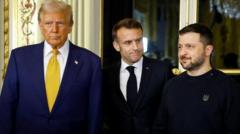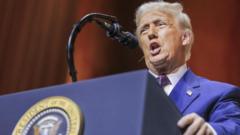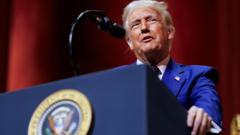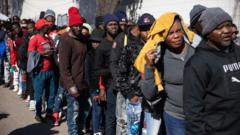Amid escalating tensions surrounding the Ukraine conflict, Donald Trump has publicly criticized both French President Emmanuel Macron and UK Prime Minister Keir Starmer for their apparent lack of effective action towards achieving peace. Trump’s controversial remarks come just ahead of meetings with these leaders at the White House next week, creating a challenging political atmosphere as negotiations progress.
Trump Critiques Macron and Starmer on Ukraine Peace Efforts

Trump Critiques Macron and Starmer on Ukraine Peace Efforts
Former President Trump argues that key European leaders have made little progress in resolving the ongoing war in Ukraine, igniting debate ahead of their upcoming visits to Washington.
In a recent interview with Fox News, Trump expressed doubts regarding Ukraine's President Volodymyr Zelensky's role in peace talks, stating he believes Zelensky has "no cards" to play in negotiations and is therefore ineffective in meetings. His comments reflect a departure from the positions held by European allies, who have consistently supported Ukraine since Russia’s full-scale invasion in 2022 and have provided military aid and sanctions against Russia.
The backdrop to Trump’s statements includes a crisis summit held in Paris by European leaders, where discussions revolved around the necessity of Ukraine’s involvement in peace negotiations. Despite Trump’s criticisms, he offered some praise for Macron and Starmer, labeling them as friends, which indicates a complex dynamic in transatlantic relations.
Starmer has recently indicated a willingness to deploy UK troops to Ukraine to enhance security, while Macron is also actively addressing the implications of the conflict for Europe. Their presence in Washington signifies a continued desire for collaboration among Western allies in addressing the war.
Furthermore, Trump’s comments about Zelensky have drawn scrutiny, and his critique is seen as aligning with narratives that resonate more with Moscow than with U.S. policy. Despite expressing admiration for Zelensky as a leader, he has previously labeled him a “dictator,” highlighting the contradictory nature of his statements.
In contrast, Trump’s envoy to Ukraine, Keith Kellogg, characterized discussions with Zelensky as productive, underscoring the complexities involved in U.S.-Ukraine relations. As peace talks continue, the potential for Ukraine to negotiate mineral rights with the U.S. is also being discussed, which raises questions about the implications for Ukrainian sovereignty.
The friction between Trump's views and established European positions may pose challenges as Macron and Starmer attempt to assert their relevance in future negotiations and seek to facilitate a peaceful resolution to the ongoing conflict in Ukraine. The outcome of these interactions will be crucial in determining the path forward for Ukraine, Europe, and U.S. foreign policy in the region.
The backdrop to Trump’s statements includes a crisis summit held in Paris by European leaders, where discussions revolved around the necessity of Ukraine’s involvement in peace negotiations. Despite Trump’s criticisms, he offered some praise for Macron and Starmer, labeling them as friends, which indicates a complex dynamic in transatlantic relations.
Starmer has recently indicated a willingness to deploy UK troops to Ukraine to enhance security, while Macron is also actively addressing the implications of the conflict for Europe. Their presence in Washington signifies a continued desire for collaboration among Western allies in addressing the war.
Furthermore, Trump’s comments about Zelensky have drawn scrutiny, and his critique is seen as aligning with narratives that resonate more with Moscow than with U.S. policy. Despite expressing admiration for Zelensky as a leader, he has previously labeled him a “dictator,” highlighting the contradictory nature of his statements.
In contrast, Trump’s envoy to Ukraine, Keith Kellogg, characterized discussions with Zelensky as productive, underscoring the complexities involved in U.S.-Ukraine relations. As peace talks continue, the potential for Ukraine to negotiate mineral rights with the U.S. is also being discussed, which raises questions about the implications for Ukrainian sovereignty.
The friction between Trump's views and established European positions may pose challenges as Macron and Starmer attempt to assert their relevance in future negotiations and seek to facilitate a peaceful resolution to the ongoing conflict in Ukraine. The outcome of these interactions will be crucial in determining the path forward for Ukraine, Europe, and U.S. foreign policy in the region.





















